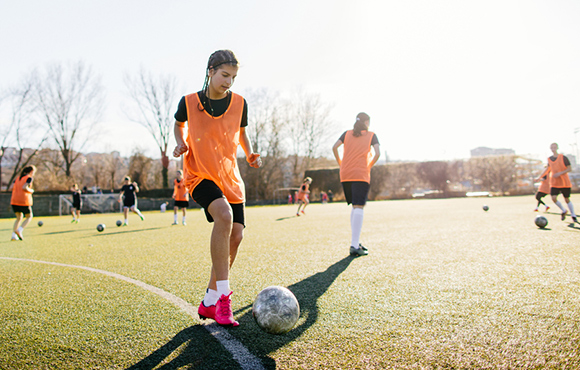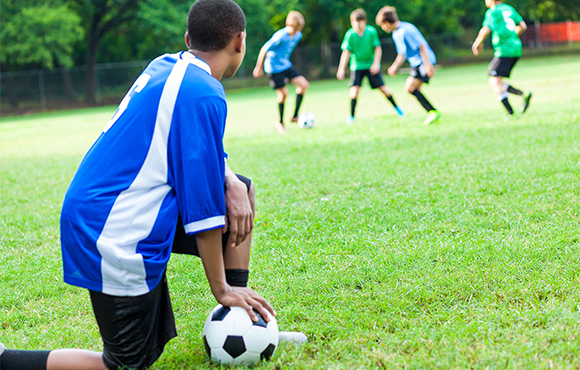Many kids and teens are crippled by a fear of failure or embarrassment. Some young athletes may worry about impressing a coach or parent, while others sabotage their performance due to a lack of confidence.
Overcoming these mental setbacks can help an athlete have a better experience at tryouts. Here are seven tips to help kids perform their best.
Let Go of Fear
1 of 8
In sports, athletes may be afraid of getting hurt, or they may experience psychological fear based on their perception of the importance of their performance.
Most of the time, athletes worry about poor results or negative outcomes (losing a game or not making the team). Kids sometimes fear the negative consequences of their performance and worry about aspects of the game that they can't control.
The first step to overcome this fear is to identify the concerns and expectations that can change the way an athlete performs. When a child or teen feels fearful, it can cause him or her to be overly cautious or timid.
Help your kids identify their fears and reassure them that you'll be proud of them for their effort regardless of the final outcome.
Find:
Play Hard, Don't Hold Back
2 of 8
During mental toughness training, I teach my students about two mindsets that contribute to success in sports. The first is the training or practice mindset. Great athletes know the value of training, and they constantly strive to improve. They have a strong work ethic and a tremendous amount of motivation, which helps them practice hard to master their skills.
The second aspect is the trusting or performance mindset, and it's equally important to be successful in sports. Trust is the ability to let things happen instinctively and rely on practice instead of consciously directing movements. The performance mindset gives an athlete the ability to rely on training and allow their skills to flow without excess thought.
The bottom line: Encourage your kids to practice so they can improve, build confidence, and rely on their training to help them perform intuitively.
Find:
Don't Be Intimidated
3 of 8
Although some athletes purposely try to play head games or intimidate an opponent, the majority of intimidation in youth sports is self-induced.
The level of competition, a particular venue or big event like tryouts, can cause a young athlete to feel intimidated. Also, kids who lack confidence often look to others to help them feel self-assured. These same athletes, however, can intimidate themselves by paying too much attention to others. Most self-induced intimidation comes from an athlete giving too much energy to other competitors, making comparisons, or doubting their own ability.
Remind your son or daughter not to worry about other competitors. Encourage them to have faith in their own abilities and to always try their best.
Find:
Perform for Yourself
4 of 8
A lot of performance anxiety stems from the need to seek social approval from others. If this sounds like your son or daughter, he or she might feel the need to be liked, admired, accepted or respected. Your child may worry about performing poorly and think this will have a negative influence on what others think.
Athletes who seek external approval and validation have a tendency to be fearful or anxious. The need for social approval is the root of the fear of failure. This is the case for many of the students that I work with; athletes look to others for approval so they can feel better about themselves.
If you can help your kids understand why they value (sometimes too much) others' opinions, you can help them develop self-respect instead of relying on external acknowledgement.
Find:
Don't Try to Be Perfect
5 of 8
An important lesson I teach my students is to learn how to perform efficiently instead of perfectly. I call this a functional mindset.
A functional mindset begins with the idea that an athlete doesn't have to be perfect to perform their best. Athletes are human, and humans can't be perfect. Kids need to understand that mistakes are inevitable; they're a part of sports and can often serve as important learning opportunities.
Find:
Be Confident
6 of 8
My definition of self-confidence is how firmly an athlete believes in his or her ability to perform a task or execute a skill. Confidence is derived from a baseline assessment of past performance, training and preparation. As an athlete's skills improve, his or her confidence becomes proportionately stronger.
Confidence can be a cure-all for the mental setbacks an athlete may encounter. If a child or teen has high self-confidence, they're less likely to get anxious or nervous because they believe they will perform well. An athlete with confidence can remain relaxed and focused rather than worrying about the competition or a negative outcome.
Some athletes start doubting themselves before they even begin tryouts. They may struggle with doubt due to a past performance or mistake; this can sabotage an athlete's confidence.
It's important for you as a parent to help your child learn from their mistakes rather than dwelling on them. The first step to overcome self-doubt is to be aware of the thoughts that can affect confidence. The next step is to counter the doubts with positive thoughts that can lead to a better outcome.
Read More: 5 Ways for Young Athletes to Build Confidence
Find:
Focus on the Process, Not the Results
7 of 8
This mental technique is helpful when athletes compete, but only if they focus their attention on "performance cues" which help them play their best. A performance cue is any thought, feeling or image that helps an athlete execute a skill.
Many of the athletes I work with tend to overload their brains with too much information--more than they can handle at one time. Information overload sends mixed signals to the body. In this state, the body can't execute at its full potential.
Once an athlete defines performance cues, he or she will be able to eliminate distractions and be more focused--an important quality to be stay present and be "in the zone" in sports.
Find:
8 of 8
Back to Beginning
Next Gallery
7 Benefits of Team Sports for Kids






